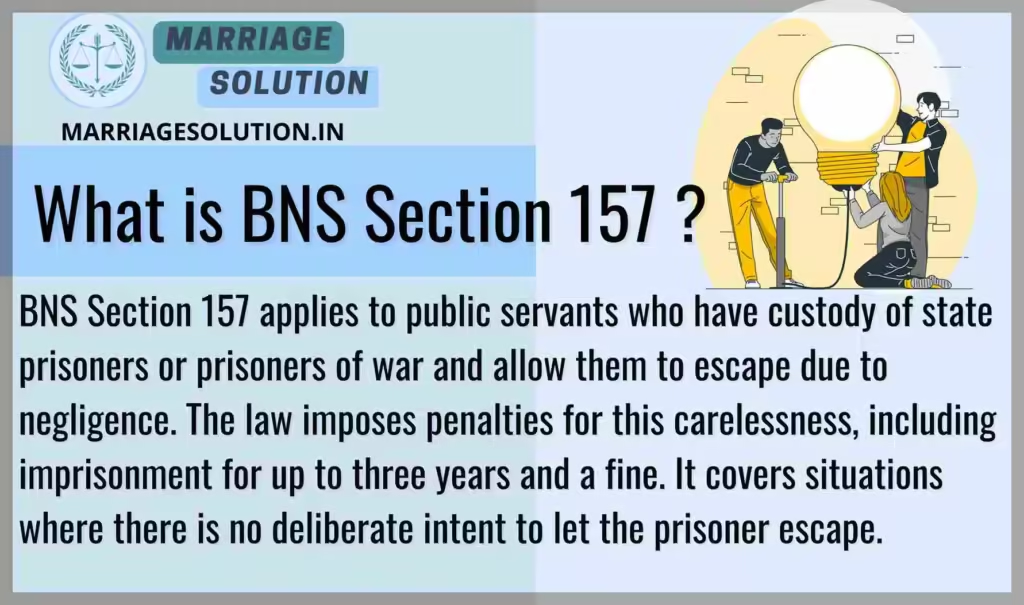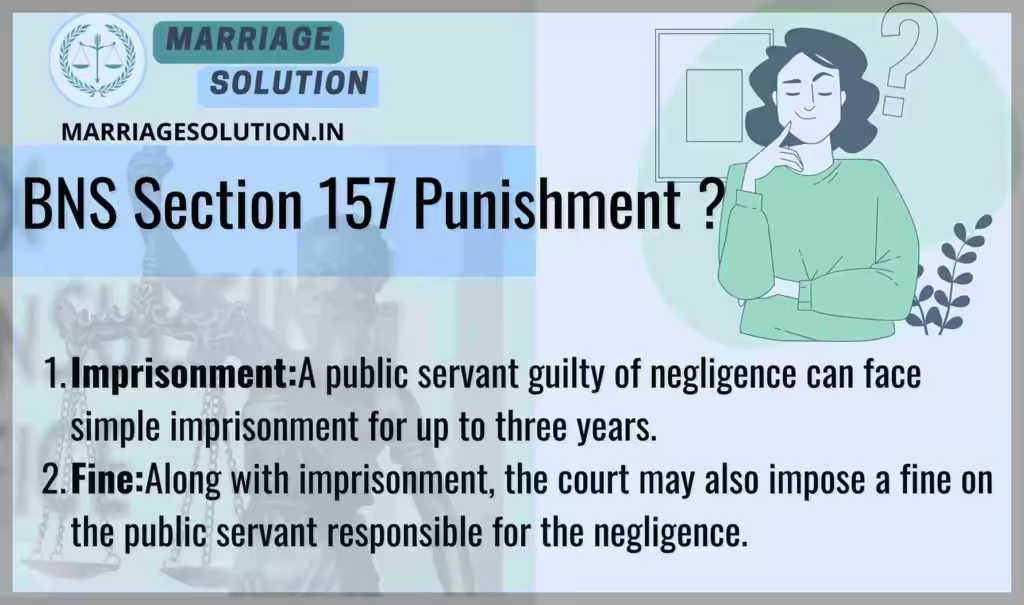Introduction of Section 157 BNS
157 BNS deals with situations where a public servant negligently allows a State prisoner or a prisoner of war to escape from custody. Unlike Section 156, which punishes deliberate betrayal, Section 157 focuses on carelessness or lack of due diligence in discharging official duties.
The law ensures that public servants remain vigilant in their responsibilities, especially when dealing with high-risk prisoners. If negligence results in an escape, the officer can face up to three years of simple imprisonment, a fine, or both. This provision underlines accountability, national security, and strict standards for prison management while maintaining fairness by distinguishing negligence from intentional misconduct.
The Bharatiya Nyaya Sanhita (BNS) Section 157 replaces the old Indian Penal Code (IPC) Section 129.
What is BNS Section 157 ?
BNS Section 157 applies to public servants who have custody of state prisoners or prisoners of war and allow them to escape due to negligence. The law imposes penalties for this carelessness, including imprisonment for up to three years and a fine. It covers situations where there is no deliberate intent to let the prisoner escape.

Section 157 Bharatiya Nyaya Sanhita
Whoever, being a public servant and having the custody of any State prisoner or prisoner of war, negligently suffers such prisoner to escape from custody, shall be punished with simple imprisonment for a term which may extend to three years, or with fine, or with both.”
Explanation in Simple Terms
- Who is Covered?
Only applies to public servants (jail staff, police, military personnel, etc.) responsible for guarding a State prisoner or a prisoner of war. - What is the Crime?
If due to negligence or carelessness, the prisoner escapes → the officer is guilty.
Difference from Section 156: In 156, the escape is intentional. In 157, it is due to negligence. - Punishment:
- Simple imprisonment up to 3 years, or
- Fine, or
- Both.
- Nature of Offense:
- Cognizable → Police can arrest without a warrant.
- Bailable → Bail is allowed.
- Non-compoundable → Cannot be settled outside court.
- Triable by Magistrate of First Class.
Key Elements of BNS Section 157
- Applies to Public Servants only.
- Covers State prisoners & prisoners of war.
- Negligence → not deliberate action.
- Escape must happen due to lack of proper care.
- Simple imprisonment up to 3 years.
- Fine may also be imposed.
- Cognizable offense.
- Bailable offense.
- Non-compoundable → no compromise.
- Tried by Magistrate of First Class.
Why BNS Section 157 is Important
- Ensures Accountability → Even negligence is not excused when national security is at stake.
- Differentiates Intent from Negligence → Maintains fairness by punishing careless acts separately from deliberate betrayal (Section 156).
- Strengthens Prison Management → Forces public servants to maintain vigilance and discipline.
- Protects National Security → Prevents dangerous prisoners from escaping due to carelessness.
- Builds Public Confidence → Citizens know that negligence in sensitive posts has consequences.
Examples
- Example 1: A jailer forgets to lock a prisoner of war’s cell properly, allowing him to escape. → Negligence → punishable under Section 157.
- Example 2: A police officer tasked with transporting a State prisoner leaves him unguarded at a public place, and the prisoner runs away. → Negligence → covered under Section 157.
Section 157 BNS Overview
This section talks about a situation where a public servant, like a police officer or jailer, is responsible for a prisoner and lets that prisoner escape by being careless or negligent. If this happens, the public servant can be punished with imprisonment and a fine.
10 Key Points of BNS Section 157
- Who It Applies To:
This section is only for public servants, such as police officers, jail staff, or military personnel who are in charge of prisoners. - Type of Prisoners Involved:
The law applies to both State prisoners (people arrested for crimes against the State) and prisoners of war (enemies captured during wartime). - Negligence of the Public Servant:
The public servant must have been negligent, meaning they didn’t do their job properly, leading to the prisoner’s escape. The escape must be because of their carelessness. - Type of Escape:
The escape must happen from a place where the prisoner is supposed to be confined, like a jail, prison, or detention center. - Punishment – Imprisonment:
If a public servant is found guilty of letting a prisoner escape, they can be punished with simple imprisonment for up to 3 years. - Punishment – Fine:
Besides imprisonment, the public servant will also have to pay a fine. The amount of the fine is decided by the court. - Cognizable Offense:
This offense is cognizable, which means the police can arrest the public servant without a warrant if they suspect negligence. - Bailable Offense:
The offense is bailable, meaning the public servant can apply for bail and may be released from custody while waiting for the trial. - Non-Compoundable Offense:
This offense is non-compoundable, meaning it cannot be settled out of court between the public servant and the authorities. - Trial by Magistrate:
The trial for this offense will be conducted by a Magistrate of the first class, which is a type of judge who handles more serious cases.
Two Examples of BNS Section 157
- Example 1:
A jailer in charge of a prisoner of war forgets to lock the cell door properly. The prisoner escapes during the night because of this carelessness. The jailer can be punished under Section 157 for negligence. - Example 2:
A police officer is supposed to transport a State prisoner from the court to the jail. The officer is not paying attention, and the prisoner runs away during the journey. The officer could be charged under this section for letting the prisoner escape due to negligence.
BNS 157 Punishment
Imprisonment:
A public servant guilty of negligence can face simple imprisonment for up to three years.
Fine:
Along with imprisonment, the court may also impose a fine on the public servant responsible for the negligence.

BNS 157 bailable or not ?
Yes, BNS Section 157 is a bailable offense. This means that the accused public servant can apply for and be granted bail during the trial process.
Bharatiya Nyaya Sanhita Section 157
| Section | What it Means | Punishment | Bail | Cognizable? | Trial By |
|---|---|---|---|---|---|
| BNS Section 157 | Applies to public servants who negligently allow a State prisoner or prisoner of war to escape from lawful custody due to carelessness or lack of duty. | Simple imprisonment up to 3 years, or fine, or both. | Bailable (officer can seek bail) | Cognizable (arrest without warrant) | Magistrate of the First Class |
| IPC Section 129 (Old) | Dealt with any public servant negligently allowing a prisoner to escape from custody — without specifying State or war prisoners. | Simple imprisonment up to 3 years, or fine, or both. | Bailable | Cognizable | Magistrate of the First Class |
BNS Section 157 FAQs
What does BNS Section 157 cover?
It covers situations where public servants allow a state prisoner or prisoner of war to escape due to negligence or carelessness.
Is BNS Section 157 a serious offense?
Yes, it is serious but not as severe as intentional offenses. It deals with negligence, not deliberate actions.
What is the punishment under BNS Section 157?
The punishment is simple imprisonment for up to three years and a fine.
Can someone be granted bail under BNS Section 157?
Yes, the offense is bailable, and the accused public servant can apply for bail.
Who tries cases under BNS Section 157?
The case is tried by a Magistrate of the first class, indicating its relatively moderate severity.
Conclusion
BNS Section 157 ensures that public servants remain alert and responsible while guarding State prisoners or prisoners of war. While it differentiates between intentional (BNS 156) and negligent (BNS 157) escape, it still punishes carelessness that could harm national security. By making the offense cognizable, bailable, and non-compoundable, the law strikes a balance — it enforces accountability but with lesser punishment compared to deliberate misconduct.
Need Legal Support?
If you’re facing court proceedings, marriage-related issues, or any legal matter, our team at Marriage Solution – Lawyer Help is ready to guide you. Just complete our easy online enquiry form, and we’ll connect you with the right legal assistance tailored to your needs.
Finished with BNS 157 ? Continue exploring the next provisions of the Bharatiya Nyaya Sanhita (BNS), 2023. Each section includes explanations, examples, and plain-language breakdowns for easy understanding.
- 158 BNS : Aiding escape of, rescuing or harbouring such prisoner.
- https://marriagesolution.in/bns_section/158-bns/
Chapter VIII – Of Offences Relating To The Army, Navy And Air Force
- 159 BNS : Abetting mutiny, or attempting to seduce a soldier, sailor or airman from his duty.
- https://marriagesolution.in/bns_section/159-bns/
- 160 BNS : Abetment of mutiny, if mutiny is committed in consequence thereof.
- https://marriagesolution.in/bns_section/160-bns/
- 161 BNS : Abetment of assault by soldier, sailor or airman on his superior officer, when in execution of his office.
- https://marriagesolution.in/bns_section/161-bns/
- 162 BNS : Abetment of such assault, if the assault committed.
- https://marriagesolution.in/bns_section/162-bns/
Full IPC Section List: https://marriagesolution.in/ipc-section-list
All Indian Law & Blogs: https://marriagesolution.in/indian-law/
Full BNSS Section List: https://marriagesolution.in/bnss_section-list
